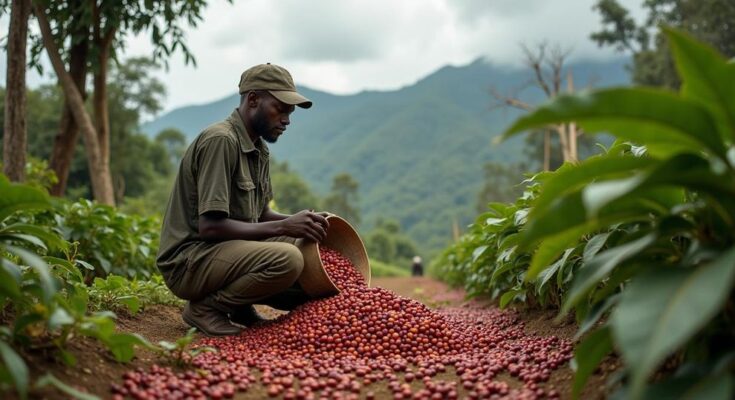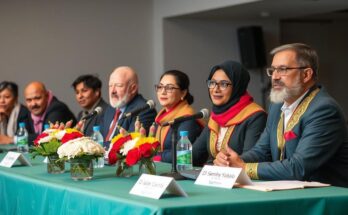The Democratic Republic of the Congo is witnessing a resurgence in its coffee industry due to international demand for specialty coffee. With support from USAID, coffee cooperatives in South Kivu are enhancing their practices, securing better deals, and achieving recognition in international markets. The establishment of a quality certification laboratory and increased market access are empowering farmers, allowing them to cultivate pride and stability in their livelihoods.
The Democratic Republic of the Congo (DRC), once renowned for its robust coffee industry, experienced substantial setbacks due to prolonged instability and conflict that led to a significant decline in both coffee production and exportation over the past several decades. However, with the surge in international demand for specialty coffee, there are promising signs of revitalization within the nation’s coffee sector, positioning it to reclaim its status as a noteworthy coffee producer. In the province of South Kivu, a partnership funded by USAID is facilitating the enhancement of coffee production through cooperative efforts among farmers. These cooperatives are improving their practices from the harvesting phase to market delivery and securing international buyers. Farmers are gaining insights into the optimal timing for harvesting their coffee cherries, as the quality of the beans is directly linked to the timing of their harvest – similar to other fruits, they must be picked at peak ripeness to achieve superior taste. This newfound knowledge is pivotal in differentiating between low-value and high-value specialty coffee, thereby enabling farmers to command better prices in the global marketplace. The initiatives undertaken have yielded positive outcomes; for instance, the cooperatives were successful in negotiating a pre-harvest financing agreement with Westrock Coffee, allowing farmers to receive upfront payments for their harvested cherries. Furthermore, the coffee cooperatives in South Kivu achieved remarkable success at the inaugural international coffee cupping competition hosted in the DRC in 2015, receiving commendable ratings. Timothy Fella, a coffee buyer and judge at the event, noted, “I am … trying to get my hands on as much of this coffee as possible, and I have no doubt there are buyers lined up trying to get it.” This emphasizes the strong market interest in the quality of Congolese coffee. The cooperatives successfully sold five shipping containers of premium, fully washed coffee beans to notable U.S. retailers including Starbucks, Counter Culture Coffee, and Sweet Maria’s, branding these beans as single-origin Congolese coffee. This increase in sales signifies a new chapter for these farmers; with the higher prices from international sales, local traders are now more inclined to offer better deals for their remaining coffee harvest. Historically, farmers like Constantin Kasikagwe Mukuba had limited market access and could only sell their coffee to buyers in Rwanda, which often necessitated perilous crossings over large bodies of water, fraught with danger. However, with the opportunity to sell legally and securely, the need for these hazardous trips has diminished. To further professionalize the coffee industry, USAID has established the first-ever coffee-tasting laboratory in Bukavu, managed by the Office Nationale du Café. This facility will enable government regulators to certify coffee quality and will provide additional training for farmers, equipping them with essential skills in coffee tasting and quality assessment for the re-establishment of the coffee sector in the DRC. The remarkable transformation seen in coffee production and enhanced livelihoods can be attributed to the Kivu Specialty Coffee: Kahawa Bora Ya Kivu project, which has been funded by USAID and the Howard G. Buffet Foundation and implemented through Catholic Relief Services, the Eastern Congo Initiative, and World Coffee Research since its inception in 2012. This four-year project aims to improve the living conditions of smallholder coffee farmers, strengthen farmer cooperatives, reform governmental policies to facilitate coffee export growth, and elevate the profile of Congolese coffee among global consumers. As the farmers develop their skills to attract buyers from regions such as the United States, Europe, and Korea, they are experiencing an enhanced sense of professionalism and pride in their work. Mukuba insightful remarks, “Now we have everything we need here. Thanks to the fields, I can educate my children. I can feed my family.”
The Democratic Republic of the Congo, located in Central Africa, has a historical significance in coffee production, having once been a leading exporter. However, decades of conflict and political instability severely crippled this sector, resulting in a decrease in both production and export capabilities. As coffee has garnered a reputation as a specialty product internationally, the potential for revitalization in the DRC’s coffee industry has become increasingly viable. Educational and infrastructural support from organizations like USAID is paving the way for local farmers to improve their practices and access new markets, enabling them to reclaim their place in the global coffee industry.
In conclusion, the revival of the Congolese coffee industry in the Democratic Republic of the Congo represents a significant turnaround from the previous decline due to conflict and instability. Through strategic partnerships and training programs funded by USAID and other organizations, farmers have improved their production methods and gained access to international markets. This transformation not only enhances the livelihoods of coffee farmers but also contributes positively to the local economy. The prospects of Congolese coffee continue to brighten as the country strives to reclaim its historical status within the global specialty coffee market.
Original Source: www.usaid.gov




